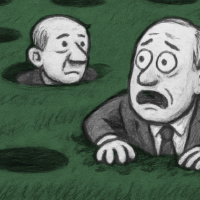
On May 1, 2011, President Barack Obama informed America and the world that Osama bin Laden, leader of the terrorist al Qaeda network, had been killed in Abbottabad, Pakistan. The stunning announcement marked the most important accomplishment in the United States' efforts to combat global terrorism to date. According to U.S. officials, the helicopter raid that resulted in bin Laden's death was carried out by CIA operatives in conjunction with the elite Navy SEAL Team Six.1 While he applauded the successful raid, President Obama was careful to stress that America's war on terror was not over. The President stated that for more than two decades, bin Laden had been al Qaeda's leader and symbol:
"The death of bin Laden marks the most significant achievement to date in our nation's effort to defeat al Qaeda. But his death does not mark the end of our effort. There's no doubt that al Qaeda will continue to pursue attacks against us. We must and we will remain vigilant at home and abroad."2
An important aspect of America's war against terror is the prevention of terrorist financing which helps to facilitate the commission of terrorist acts. This article briefly examines the issue of bin Laden's death in relation to the fight against terrorist financing.
Osama bin Laden and his Agenda of Terror
Bin Laden was born in Djidda, Saudi Arabia in 19573 to Muhammed bin Oud bin Laden, a Yemeni citizen and millionaire businessman. The young bin Laden could have gone on to a life of privilege and entrepreneurship but his involvement with Islamic radicals at King Abdul-Aziz University where he studied in later years would change the course of his life forever.4 In 1979, he left Saudi Arabia for Afghanistan to join the rebellion against the Soviet invasion of that country. In the wake of the Soviets' withdrawal from Afghanistan, he returned to Saudi Arabia where he was subsequently expelled due to his anti-government rhetoric.5 By this time, he had created al Qaeda (the base) and was opposed to the continued U.S. presence in Saudi Arabia. After his expulsion from Saudi Arabia, he set up base in Sudan in 1991. He spent about five years there before U.S. pressure prompted the Sudanese Government to expel him.6 He then returned to Afghanistan where he continued the work of his terror network under the protection of that country's Taliban7-led government, he established training camps there. He was also connected to the 7 August 1998 bombings of the U.S. embassies in Dar es Salaam, Tanzania, and Nairobi, Kenya. Bin Laden and al Qaeda later claimed responsibility for the September 11, 2001 attacks on the United States.8 The attacks occurred when al Qaeda terrorists hijacked four American passenger jets, crashing three of them into the World Trade Center in New York and the Pentagon outside Washington. The fourth hijacked jet, United Flight 93, crashed into the Pennsylvania countryside after passengers fought the perpetrators. More than 3,000 people were killed in all these attacks combined; the embassy bombings killed 224 civilians and wounded more than 5,000 others.9 Since 2001, bin Laden had been on the run, a fugitive relentlessly pursued by America and its allies. It goes without saying that his and al Qaeda's terrorist activities would not have occurred without millions of dollars in terrorist financing from a variety of sources.
Efforts Against Terrorist Financing
The term "terrorist financing" is frequently used to portray two separate types of activity. On the one hand, it can consist of the financing of operational terrorist cells, like the hijackers who executed the September 11 attacks.10 In this respect, financing constitutes funding the needs of the cell for accommodations, food, training and planning in an effort to carry out the terrorist action. On the other hand, terrorist financing may refer to the process of raising funds needed to fund terrorist activities. Groups such as al Qaeda or Hamas engage in such fundraising which often takes place through charities, which "may raise money for legitimate humanitarian purposes and divert a fraction of their total funds for illicit purposes."11
Following the September 11 attacks, the fight against terrorism intensified. Former American President George W. Bush issued Executive Order 13224 declaring a national emergency to address the menace of terrorism.12 The U.S. Congress enacted the USA PATRIOT Act which provides measures aimed at detecting, preventing, and suppressing (money laundering and) terrorist financing.13 Furthermore, the United Nations Security Council (U.N.S.C.) unanimously adopted Resolution 1373 which universally enjoins member states to commit to formulating numerous counterterrorism measures. An intergovernmental body established by the G-7 nations, the Financial Action Task Force (FATF) not only supported U.N.S.C. Resolution 1373 but also released nine Special Recommendations containing due diligence, disclosure, transparency, and accountability standards on which countries across the globe could model their anti-terrorism financial regulatory schemes. This wide-ranging counterterrorism framework has proved invaluable to the fight against terrorist financing.
As a result of the regulatory responsibilities placed on financial institutions and intermediaries, it has become increasingly difficult for terror groups to raise or move finances necessary to fund their criminal activities.14 It is imperative that this framework largely remains in place to prevent future acts of terrorism. As has been widely reported, the September 11 attacks were largely funded through the formal banking system such as wire transfers into the United States, the use of debit and credit card transactions and the physical transfer of cheques and other monetary instruments into the U.S. The existing enforcement regime outlined above now makes it extremely difficult to fund terrorist acts in this manner, particularly on the scale of the September 11 attacks. Of course, it would be naïve to assume that no terrorist act will ever take place in future15 but there will certainly be very few and isolated incidences because of the legislative restrictions that have been enacted since 2001.
Now, more than ever, there is a need for authorities to re-examine old terror tactics and seek out new information on how terror groups raise and move funds in order to prevent these nefarious activities. While the United States and its allies were well-versed in bin Laden's history and behaviors, there is no telling what kind of terror personality will take his place. The importance of staying one step ahead of terror perpetrators has never been more critical.
Conclusion
Interestingly, the Patriot Act comes up for review in Congress in the near future. It will be interesting to see if critics of the Act will use bin Laden's death to call for an overhaul of this statute. It would appear though, that the Obama administration will call for reauthorization of the Patriot Act16 in order to continue the fight against terrorism, terrorist financing, money laundering and other economic crimes. The Act's sections that are due to expire on May 27, 2011 empower the government to use roaming wiretaps on multiple electronic gadgets, across multiple carriers in order to get court-approved access to business records relevant to terror investigations. Another provision allows secret intelligence surveillance of foreign nationals without having to prove that there is a connection between the suspected individual and a specific terrorist group. Clearly, the government's ability to investigate and pursue terrorists will be greatly impaired if such provisions were not reauthorized. The death of Osama bin Laden, notorious as he was, should not cause America or its allies to relax their fight against terrorism financing. If anything, his death is irrefutable proof that, with determination, careful investigation and insight, the fight against terrorism financing and other economic crimes could be won.
- http://www.cbsnews.com/stories/2011/05/01/national/main20058777.shtml
- Ibid.
- http://www.fbi.gov/wanted/topten/usama-bin-laden. His aliases are listed as Usama bin Muhammad bin Laden, Shaykh Usama Bin Laden, the Prince, the Emir, Abu Abdallah, Mujahid Shaykh, Hajj, the Director.
- http://www.globalsecurity.org/military/world/para/ubl.htm
- http://www.adl.org/terrorism_america/bin_l.asp
- ibid.
- The Taliban refers to a militant Islamic group that governed parts of Afghanistan from 1996 to 2001.
- http://www.nctc.gov/site/profiles/bin_ladin.html
- Ibid.
- John Roth et al., National Commission on Terrorist Attacks upon the United States, Monograph on Terrorist Financing, available at http://govinfo.library.unt.edu/911/staff_statements/
- Ibid.
- Executive Order No. 13224 3 C.F.R. 786 (2001), reprinted as amended in 50 U.S.C. § 1701 at 741–43 (Supp. V 2007).
- X
- Op cit, John Roth et al., National Commission on Terrorist Attacks upon the United States, Monograph on Terrorist Financing.
- On May 5, 2011, the Taliban issued a statement stating that bin Laden's death would give "a new impetus to the current jihad against the invaders in this critical phase of jihad" and that 5http://www.chicagotribune.com/news/local/chi-ap-us-binladen-patriota,0,1743434.story










